Hinkley Point's female workers smash stereotypes
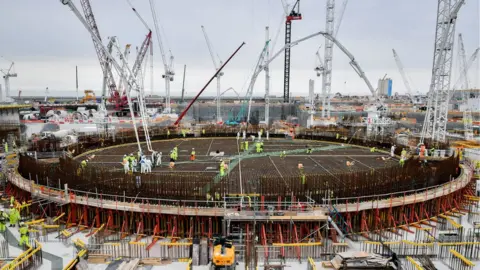 PA Media/Ben Birchall
PA Media/Ben BirchallFour female Hinkley Point C employees have revealed what it is like working in a male-dominated industry.
Steel fixer Stacey Sowden, trainee reactor operator Janaan Hussain, HR apprentice Courtney Cook and field engineer Bogdana Stîngā are all employed at the Somerset site.
The nuclear power station is due to start generating electricity in 2026.
Despite being a huge industry, just 13% of construction workers are women, according to the ONS.
Ms Sowden said she was the "only female in her team".
The former professional footballer joined the construction site as an apprentice two years ago and now works to move huge, prefabricated steel bars to build the colossal frames that will form the backbone of the site's reactors.
Most of her work was completed on Nuclear Island 1, one of the site's two 32-metre high reinforced concrete shells that will contain a nuclear reactor.
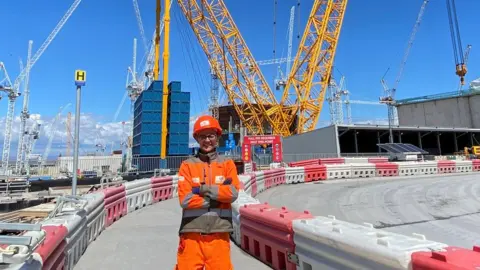 We Are England
We Are EnglandThe finished structures will be strong enough to withstand tsunamis, earthquakes and even the impact of an aircraft.
Speaking to BBC series We Are England, she said she was proud to be part of the construction phase.
"(When) I look back on it as a fully operating power plant and drive past it on the main road or the motorway I think I will always feel a sense of pride and sense of achievement for what I have been a part of," she said.
Complex role
She also challenged the stereotype that "building sites are grubby, they're dirty - the men wolf-whistle at you as you walk past on the street".
This does not mean the banter is gone, she pointed out, and the atmosphere is jocular between colleagues.
Within the industry itself there is a lack of women, with a 2017 report by the Nuclear Skills Strategy Group finding that 28% of the civil nuclear industry were women, a figure that fell to 15% for engineering roles.
Ms Hussain is one of 10 trainee reactor operators and was chosen from a field of 400 applicants.
When fully qualified she will be responsible for the supervision and control of the reactor, a technically complex role that carries with it huge responsibility.
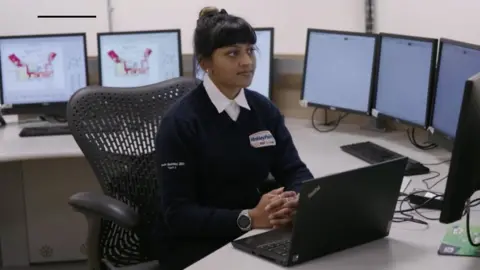 We Are England
We Are EnglandShe attributes her success to schooling, specifically the encouragement for her to take up science, technology, engineering and maths (STEM) subjects at school.
That, and a chance meeting with an astrophysicist while on holiday, prompted her to pursue a career in the field.
'Male-dominated world'
"Women aren't studying STEM," she said.
"As a woman and person of colour it has sometimes felt more difficult and feels like a male-dominated world."
Her first job in the nuclear industry saw her as one of only three women in a workforce of 200.
However, she believes the industry target of 40% women feels possible at Hinkley Point C.
"People are quite surprised when they find out what I do," she said.
"I feel like sometimes I don't fit the stereotypical reactor operation/engineer profile."
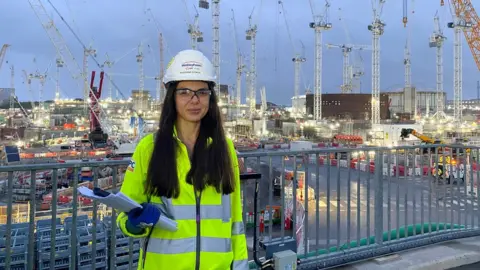 We Are England
We Are England The site operates 24 hours a day and field engineer Ms Stîngā spends her night checking that the work carried out during the day is up to scratch.
"It's very important that the surveillance team get our bit right because we are basically the final signature and after we sign (it off) the contractor can go to the next step," she explained.
"So it's vital, our role."
She said that the standard of construction on the site was "higher than normal because it's nuclear and very dangerous".
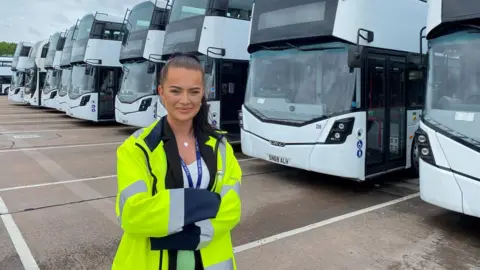 We Are England
We Are EnglandMs Cook is an HR apprentice who works for a bus company that takes staff to and from the site which is the size of 250 football pitches and home to thousands of workers.
Her role requires her to ensure that all bus drivers are happy and safe on site.
She said the "important role" meant that "not only am I dealing with them, I'm also learning all these things myself".
Ms Cook said she would like to become an HR manager "or even the HR director" in the years to come.
We Are England is broadcast on BBC West on Friday at 19:30 BST.

Follow BBC West on Facebook, Twitter and Instagram. Send your story ideas to: [email protected]
